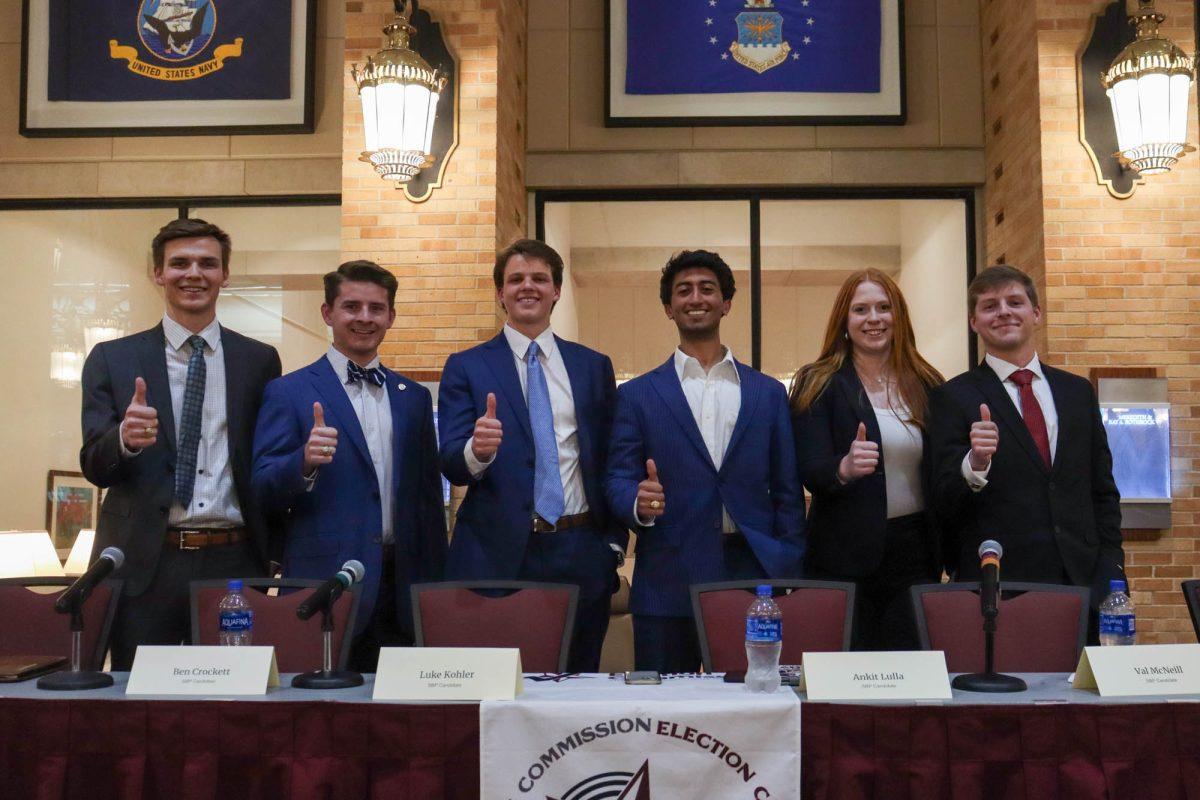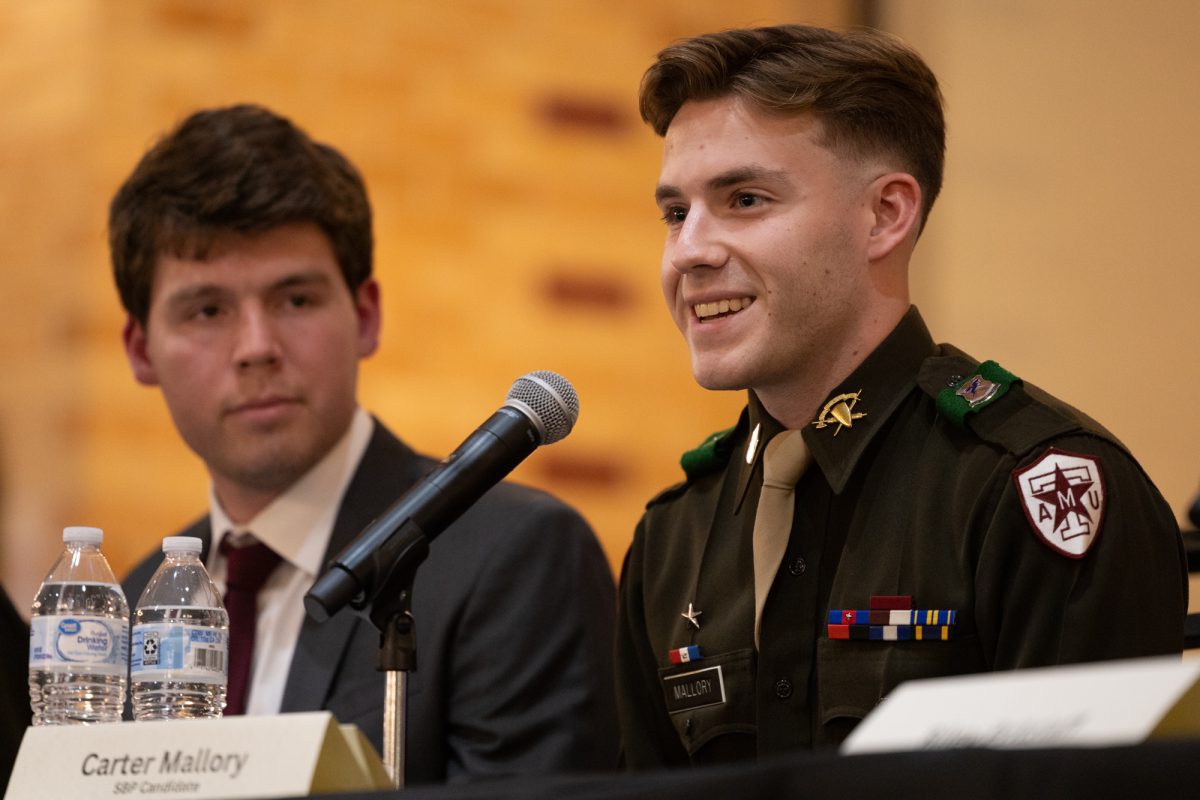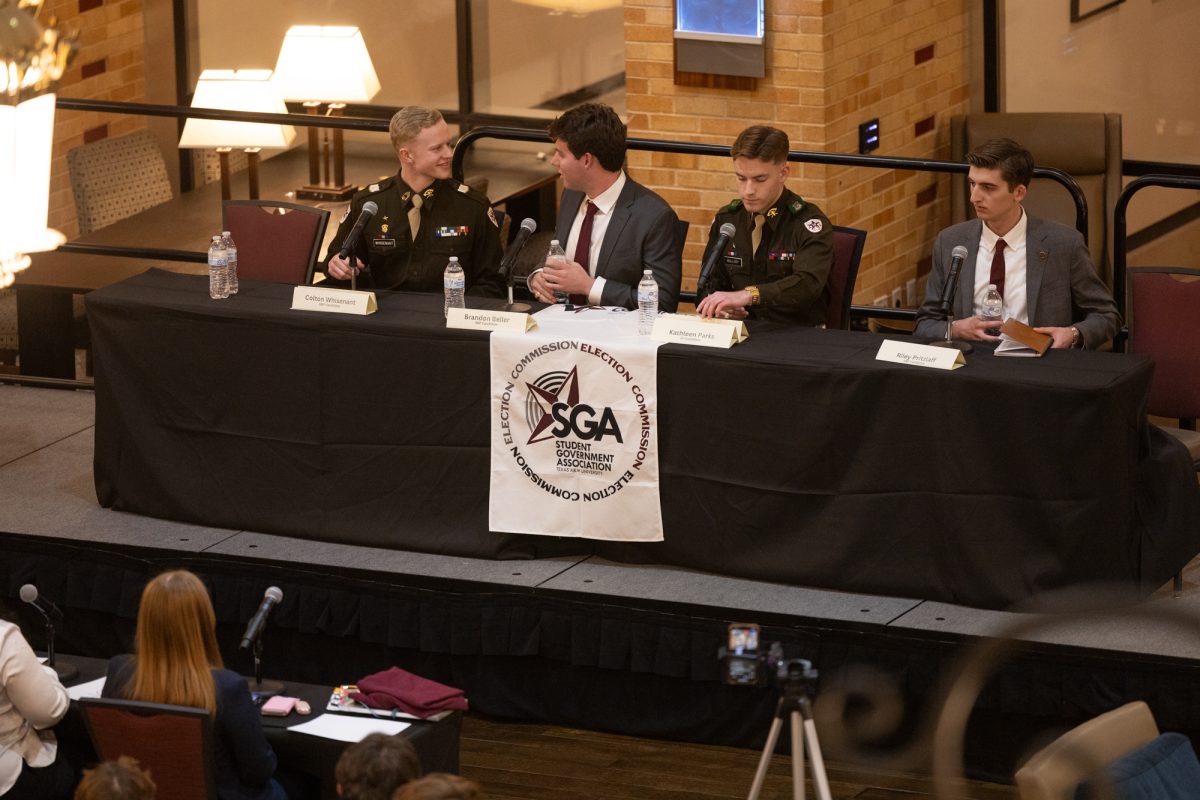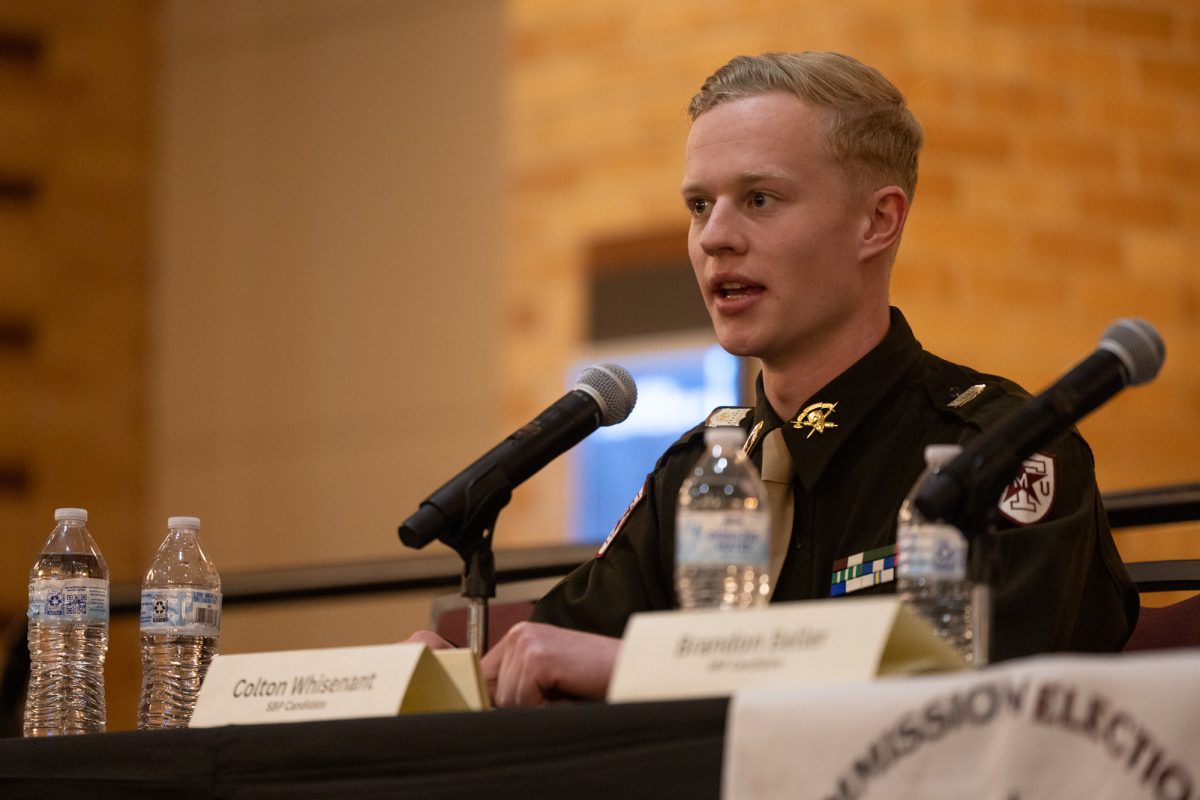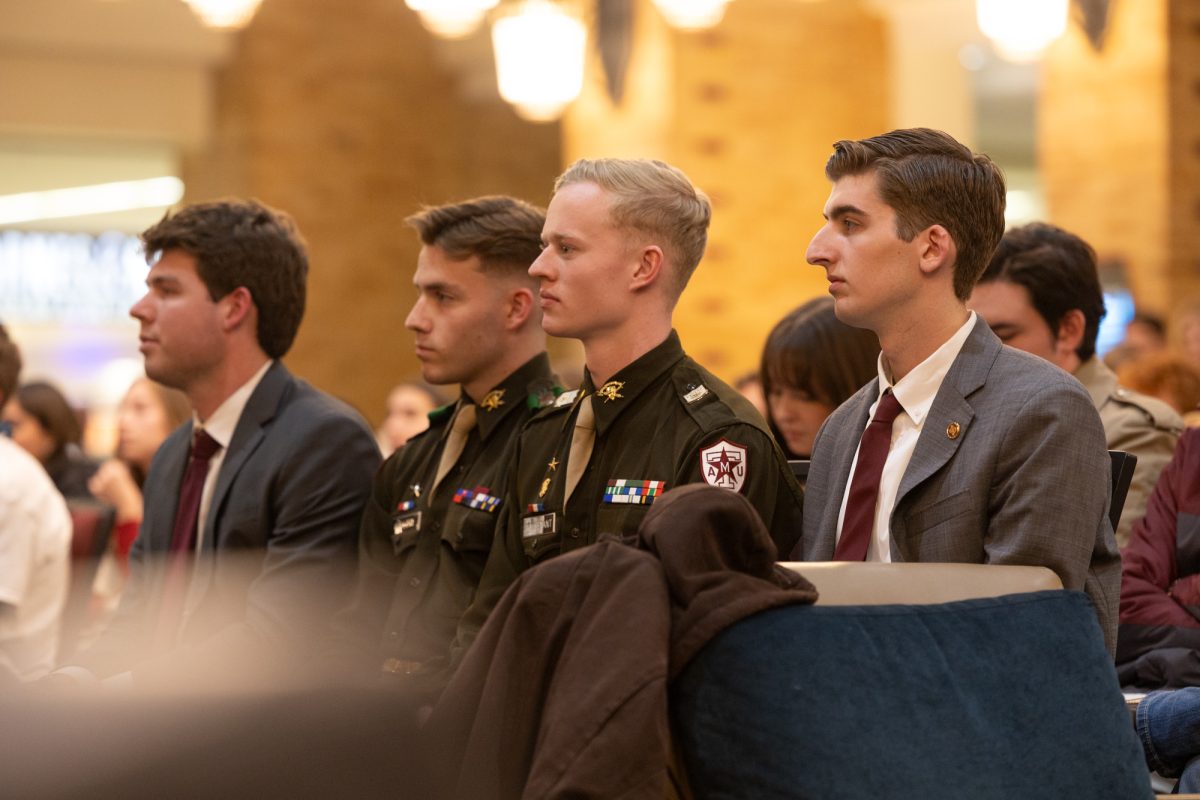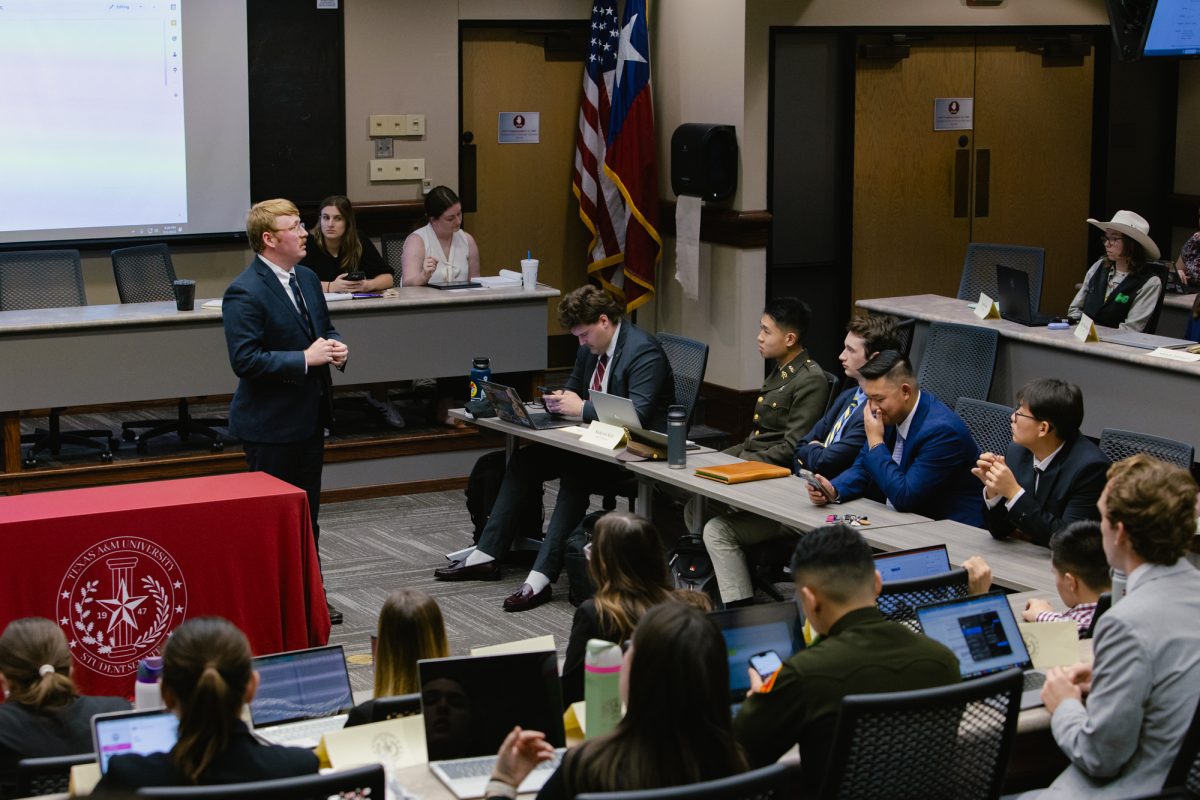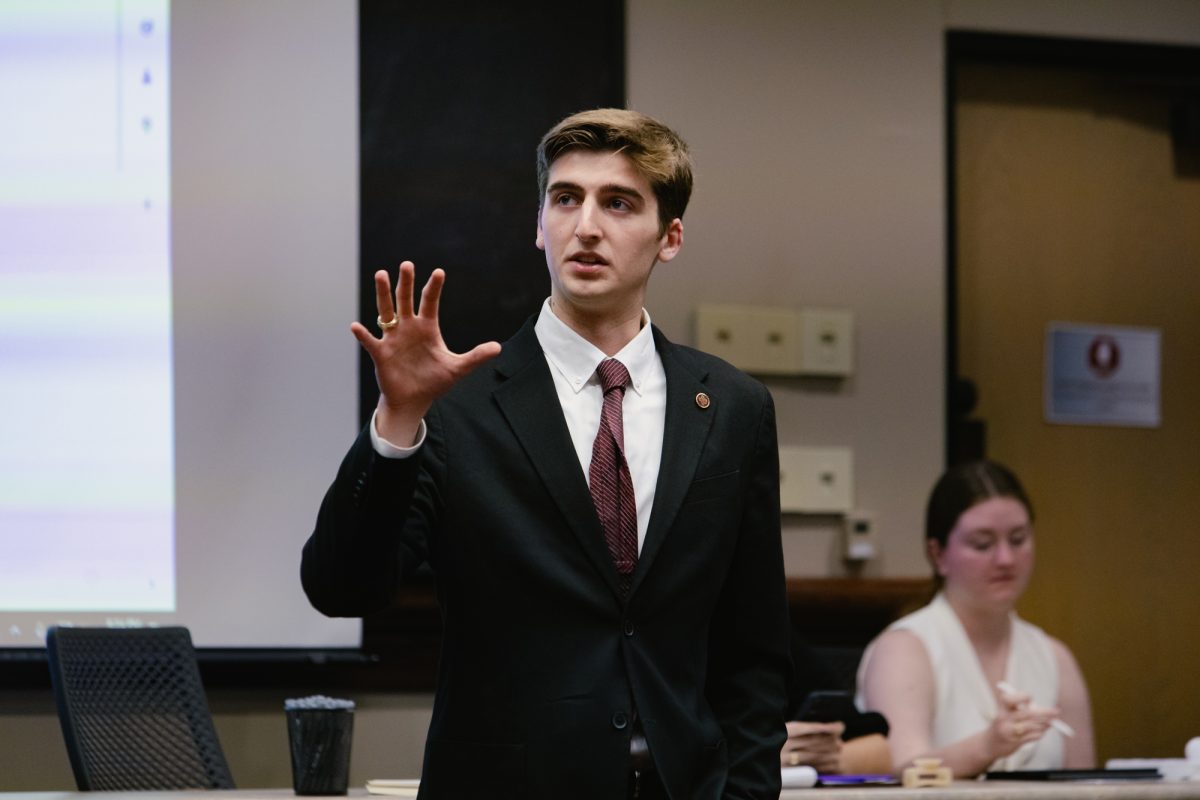Student Body President, or SBP, candidates debated at the Memorial Student Center, or MSC, flag room ahead of the spring student body election on Thursday, Feb. 22. The debate was moderated by Assistant Director of Student Assistance Services Angela Winkler and a member of the election commission.
The debate consisted of four rounds of questioning with rebuttal periods in between. The first two rounds involved questions asked by moderators all the candidates would answer. The third round involved questions candidates could ask each other, and the fourth round allowed candidates to answer questions asked by members of the student body. Each candidate had two minutes to answer questions for all rounds.
In the first round, moderators asked candidates how they planned to collaborate with student organizations and clubs to ensure their voices are heard and needs are met.
SBP candidate Carter Ostrom said one of his goals as student body president is expanding student organization opportunities.
“One of my goals is cutting administrative costs,” Ostrom said. “A lot of [student organizations] are dedicated to doing service events. Except, the money that is paid by student dues are going up to setting up these events instead of having the university stepping in.”
SBP candidate Val McNeill said voting for her is a vote for transparency.
“I’m currently doing this in my campaign by advocating for city hall services,” McNeill said. “Moving forward, it would be a focus on promoting what the student government is actually up to and making sure students have a place to tune in and know what’s going on.”
SBP candidate Ankit Lulla said he is pushing for a “Pass the Mic” initiative in his campaign
“This ‘Pass the Mic’ initiative would be an idea to allow students to come talk to me about what they want communicated to administration,” Lulla said. “From there, there would be a space where they can advocate for themselves.”
SBP candidate Luke Kohler said getting student organizations the resources they need to succeed is a priority in his campaign.
“One of the main points in my campaign is getting student organizations the ability to grow,” Kohler said. “I think every organization on campus deserves to be supported. We’re not just looking at popularity, but we believe every student deserves a voice.”
SBP candidate Ben Crockett said he would like to continue bringing students together.
“I would like to continue that tradition of bringing students together to talk about issues,” Crockett said.
SBP candidate Cade Coppinger said he wants to get everyone together to collaborate.
“I would like to gather organizations like the Corps, IFC, at an event and all that and have ideas bounce off one another,” Coppinger said. “I think that would unify the campus overall.”
In the second round, moderators asked candidates what strategies they propose for communication between A&M’s Student Government Association, or SGA, and the student body to foster transparency and accountability.
Coppinger said continuing to reach out and giving direct communication lines
“Focusing on the way we’re giving opportunities is important,” Coppinger said. “Taking feedback and communicating with administration and surveys could improve that.”
Crockett said he would like to implement a weekly “come complain” desk outside the MSC.
“There’s so many students that don’t have the ability to be in this organization or that organization,” Crockett said. “A great way to hear what’s going on in their every day student experience is making yourself available.”
Kohler said his campaign sees a viable opportunity to bridge the gap between the student body and government.
“As someone who’s not in student government, I see this as an issue,” Kohler said. “Before this, I had no idea what SGA was and I had a lot of questions. I can confidently say that there is a huge disconnect between what SGA actually does and preconceived notions people have about it. I think SGA has the tools to do great things.”
Lulla said he’s a leader who leads with empathy over authority.
“I come from a community of engineers, which a lot of people in SGA historically don’t come from,” Lulla said. “I want to be a friend to all.”
McNeill said posting minute meetings and open forums are not enough for transparency.
“At the end of the day if students don’t know to come to this, they’re not coming,” McNeill said. “Getting SGA in front of people earlier is important. It starts at Fish Camp. It starts in the dorms.”
Ostrom said he wants to bridge the gap between SGA and students.
“Every time I ask a student ‘have they voted in the student body election?’ their answer is no,” Ostrom said. “They don’t even know where to vote. Having places right outside the MSC and being out there and talking to students will be a really great way to get that going.”
In the third round candidates had the opportunity to ask each other questions.
Ostrom asked Lulla which platform point he’d focus on first and foremost.
“Subsidizing menstrual products on campus is the top issue I’m focusing on,” Lulla said. “We need someone in office to get behind this and if we continue communicating this idea, we can make it happen.”
McNeill asked Crockett how he could ensure people after him would continue his mission to end the “No-More-Than-Four” policy.
“We need to focus on ‘what would an ideal housing solution look like’” Crockett said. “The key for them would be focusing on civic engagement, bringing students across campus to city hall.”
Lulla asked Coppinger how he could unite the campus.
“For starters, I need to acknowledge that my experience is different from others,” Coppinger said. “It takes me sitting down asking way more questions than it takes me making statements. I think just being a good listener and wanting to reach out to people is key.”
Kohler asked McNeill how she plans to improve disability resources.
“Improving disability resources is a platform point I am passionate about,” McNeill said. “A surprisingly common issue students face is that they will be ghosted by professors when there are times they need to take time off school. I am advocating for a crisis communication precedence to be set.”
Crockett asked Ostrom what specifically he wants to advocate, referring to Ostrom’s campaign promise to uphold the value of “advocacy”.
“I am focused on giving back to future Aggies,” Ostrom said. “Telling high school students about the college experience will do that, and I am big on selfless service.”
Coppinger asked Kohler to discuss more about the misconceptions he held about SGA prior to running.
“It’s more of a lack of awareness of what SGA actually does,” Kohler said. “I’ve been talking to people and reaching out and they have similar experiences as me. You reaching out to them and being like ‘I want to help you’ and being able to teach them what you can do is the best way to form that relationship,”
In the fourth round, moderators asked SBP candidates questions based on student feedback. The debate concluded with each candidate providing a closing statement.
Society, ethics and law junior Kathleen Parks said she thought the debate went really well.
“We have a lot of really high caliber students running for student body president, and I think they did an excellent job tonight,” Parks said. “Crockett came with some really good policy points, and I think I trust him now more than ever to lead the student body.”
Political science junior Owen White said he thinks the candidates followed the Aggie Core Values well during the debate.
“I think we got a lot of good questions in,” White said. “I’m still deciding who I’m going to vote for, but I’ve found some candidates I really believe in. I’m happy about this debate overall.”




